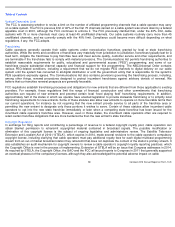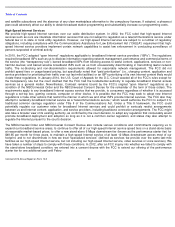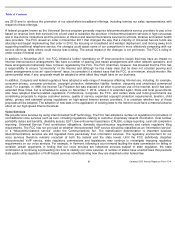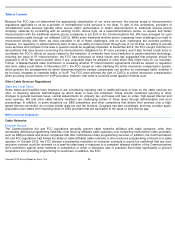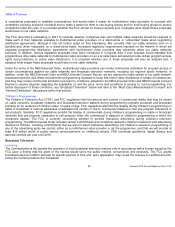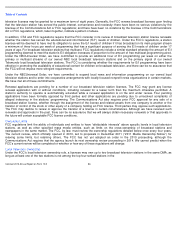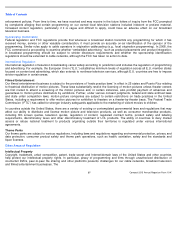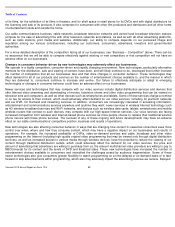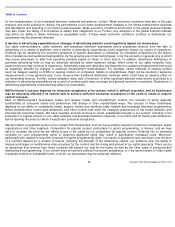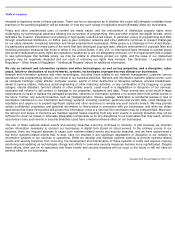Comcast 2013 Annual Report Download - page 33
Download and view the complete annual report
Please find page 33 of the 2013 Comcast annual report below. You can navigate through the pages in the report by either clicking on the pages listed below, or by using the keyword search tool below to find specific information within the annual report.
Table of Contents
unauthorized reproduction, distribution or display of copyrighted material over the Internet or through other methods of distribution,
such as through devices, software or websites that allow the reproduction, viewing, sharing and/or downloading of content by either
ignoring or interfering with the content’
s security features and copyrighted status, interferes with the market for copyrighted works
and disrupts our ability to exploit our content. The extent of copyright protection and the use of technological protections, such as
encryption, are controversial. Modifications to existing laws that weaken these protections could have an adverse effect on our
ability to license and sell our programming.
While many legal protections exist to combat piracy, laws in the United States and internationally continue to evolve, as do
technologies used to evade these laws. We have actively engaged in the enforcement of our intellectual property rights and likely
will continue to expend substantial resources to protect our content. The repeal of laws intended to combat piracy and protect
intellectual property or weakening of such laws or enforcement in the United States or internationally, or a failure of existing laws to
adapt to new technologies, could make it more difficult for us to adequately protect our intellectual property rights, which could
negatively impact their value and further increase the costs of enforcing our rights.
Copyright laws also require that we pay standard industry licensing fees for the public performance of music in the programs we
distribute, such as local advertising and local origination programming on our cable systems, as well as in the content we create.
The fees we pay to music performance rights organizations are typically renegotiated when we renew licenses with those
organizations, and we cannot predict with certainty what those fees will be in the future or if disputes will arise over them.
There is ongoing litigation related to a number of online entities that stream our broadcast television content online without the
consent of, or compensation to, NBC or its affiliates, and the U.S. Supreme Court has granted certiorari to hear the broadcasting
industry’
s challenge to one such entity. We also have brought a suit against a multichannel video provider to challenge the
commercial-
skipping functionality in its DVR. None of this litigation is final, and the courts have reached different decisions to date.
Additionally, there is a pending legislative proposal in the United States that seems intended to legitimize some of these practices.
There can be no assurance as to whether the courts will ultimately determine that these practices are unlawful or that the pending
legislation will be enacted or how any such rulings or legislation would ultimately affect our businesses.
Privacy and Security Regulation
The Communications Act generally restricts the nonconsensual collection and disclosure to third parties of cable customers’
personally identifiable information by cable operators. There are exceptions that permit such collection and disclosure for rendering
service, conducting legitimate business activities related to the service, and responding to legal requests. The Communications Act
and FCC regulations also provide privacy protections for customer proprietary network information related to our voice services.
Several states and numerous local jurisdictions have enacted privacy laws or franchise privacy provisions that apply to cable
services.
The FTC has continued to exercise authority over privacy protections generally, using its existing authority over unfair and
deceptive practices and other public proceedings to apply greater restrictions on the collection and use of personally identifiable
and other information relating to consumers. It also has undertaken numerous enforcement actions against parties that do not
provide sufficient security protections against the loss or disclosure of this type of information. In July 2013, FTC regulations
implementing the Children’s Online Privacy Protection Act (“COPPA”)
went into effect. COPPA imposes requirements on website
operators and online services that are aimed at children under 13 years of age, or that collect personal information or knowingly
post personal information from children under 13 years of age. The FTC rules impose some significant new obligations on
operators of websites and online services, including expanded categories of
Comcast 2013 Annual Report on Form 10
-
K
28



